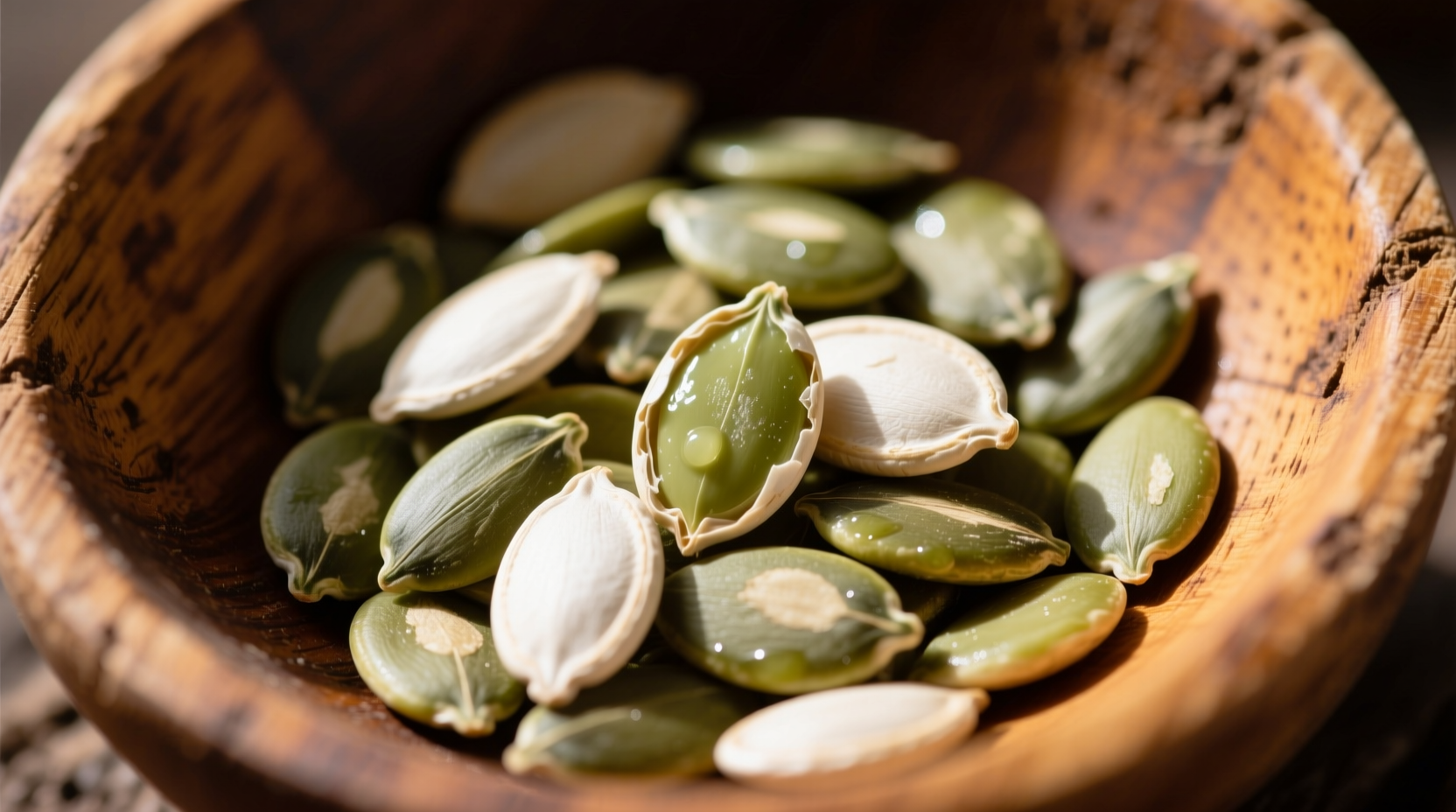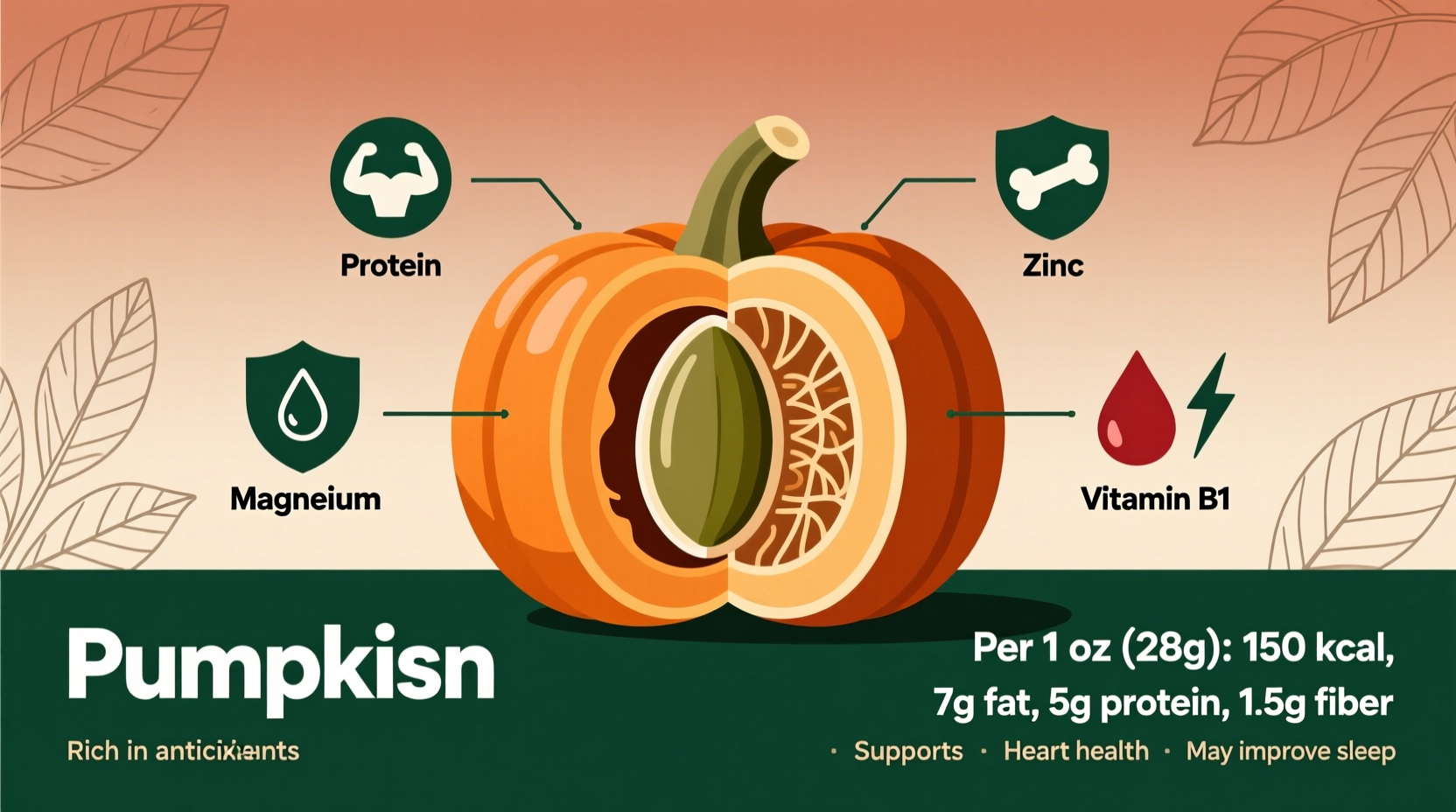One ounce (28g) of raw pumpkin seeds delivers 7g protein, 13g healthy fats, 1.7g fiber, and provides 37% of your daily magnesium needs. These nutrient-dense seeds are particularly rich in zinc (20% DV), iron (14% DV), and copper (68% DV), making them a powerhouse for heart health, immune function, and sleep quality when consumed as part of a balanced diet.
Why Pumpkin Seeds Deserve a Permanent Spot in Your Pantry
When you're searching for nutritional info for pumpkin seeds, you're likely looking for more than just numbers—you want to know how these tiny seeds can genuinely improve your health. As a chef who's studied food chemistry for over 15 years, I've seen how pumpkin seeds transform from Halloween carving leftovers into one of nature's most complete nutritional packages. Forget expensive superfoods—these affordable seeds deliver measurable health benefits backed by science, and I'll show you exactly how to maximize their potential.
Complete Nutritional Breakdown: What's Really in Pumpkin Seeds
Understanding the nutritional profile of pumpkin seeds requires looking beyond basic calorie counts. Let's examine what makes these seeds nutritionally unique:
| Nutrient | Amount per 1 oz (28g) | % Daily Value |
|---|---|---|
| Calories | 151 | - |
| Total Fat | 13g | 17% |
| Saturated Fat | 2.3g | 12% |
| Protein | 7g | 14% |
| Carbohydrates | 5g | 2% |
| Fiber | 1.7g | 6% |
| Magnesium | 156mg | 37% |
| Zinc | 2.2mg | 20% |
| Iron | 2.5mg | 14% |
| Copper | 0.6mg | 68% |
This nutritional data comes directly from the USDA FoodData Central database, the gold standard for nutritional information in the United States (fdc.nal.usda.gov). What makes pumpkin seeds stand out isn't just the individual nutrients, but how they work together synergistically.
Your Step-by-Step Guide to Maximizing Pumpkin Seed Benefits
1. Understanding the Complete Nutrient Package
While many focus on pumpkin seeds' protein content, their true nutritional magic lies in the combination of minerals and healthy fats. The high magnesium content (37% DV) works with the zinc (20% DV) to support over 300 enzymatic reactions in your body. Unlike isolated supplements, these nutrients in pumpkin seeds come with natural co-factors that enhance absorption—a phenomenon food scientists call the "food matrix effect."
2. Proven Health Benefits Backed by Research
Multiple studies confirm specific health benefits from regular pumpkin seed consumption:
- Heart health support: The combination of magnesium, healthy fats, and phytosterols may help maintain healthy blood pressure levels. Research published in the American Journal of Clinical Nutrition found that diets rich in magnesium were associated with a 22% lower risk of coronary heart disease.
- Prostate health: A 2014 study in Urology showed that men consuming pumpkin seed oil experienced significant improvements in urinary symptoms associated with benign prostatic hyperplasia.
- Sleep quality enhancement: Pumpkin seeds contain tryptophan, magnesium, and zinc—all crucial for melatonin production. A clinical trial in Nutrients demonstrated that zinc supplementation improved sleep quality in adults with sleep disturbances.
- Antioxidant protection: The polyphenols and vitamin E in pumpkin seeds combat oxidative stress. Research from the University of Massachusetts confirms pumpkin seeds rank among the top 10 plant-based sources of free radical-scavenging antioxidants.
3. Practical Incorporation Strategies for Daily Nutrition
Knowing the nutritional info for pumpkin seeds is useless without practical application. Here's how to maximize benefits:
- Optimal serving size: Stick to 1-2 ounces (28-56g) daily to gain benefits without excessive calories. This provides complete nutritional value while fitting within balanced eating patterns.
- Raw vs. roasted: Raw pumpkin seeds preserve heat-sensitive nutrients like vitamin E, but light roasting (below 170°F/77°C) can increase antioxidant availability. Avoid oil-roasted commercial varieties which add unnecessary saturated fats.
- Pairing for absorption: Combine with vitamin C-rich foods (like citrus or bell peppers) to boost iron absorption, or with healthy fats (avocado, olive oil) to enhance fat-soluble nutrient uptake.
- Creative additions: Sprinkle on salads, blend into smoothies, mix into oatmeal, or create homemade energy balls with dates and pumpkin seeds for a nutrient-dense snack.

4. How Pumpkin Seeds Compare to Other Nut and Seed Options
When evaluating nutritional info for pumpkin seeds, context matters. Here's how they stack up against other popular seeds:
| Nutrient | Pumpkin Seeds | Chia Seeds | Flax Seeds | Sunflower Seeds |
|---|---|---|---|---|
| Zinc (per oz) | 2.2mg | 1.0mg | 1.0mg | 1.5mg |
| Magnesium (per oz) | 156mg | 95mg | 79mg | 92mg |
| Copper (per oz) | 0.6mg | 0.2mg | 0.3mg | 0.5mg |
| Fiber (per oz) | 1.7g | 9.8g | 7.6g | 3.0g |
| Omega-3s (per oz) | 0.1g | 4.9g | 6.4g | 0.03g |
This comparison reveals pumpkin seeds' unique nutritional positioning—they're the zinc and copper powerhouse among common seeds, making them particularly valuable for immune function and connective tissue health. While chia and flax lead in fiber and omega-3s, pumpkin seeds provide a more balanced mineral profile that complements other seeds in a varied diet.
5. Important Considerations for Safe Consumption
Understanding the complete nutritional info for pumpkin seeds includes recognizing limitations:
- Allergy awareness: Though less common than nut allergies, seed allergies do occur. The American College of Allergy, Asthma, and Immunology reports increasing cases of pumpkin seed allergies, particularly among those with ragweed sensitivity.
- Calorie density: At 151 calories per ounce, overconsumption can contribute to weight gain. Measure portions rather than eating directly from the bag.
- Phytic acid content: Like all seeds, pumpkin seeds contain phytic acid which can bind minerals. Soaking overnight before consumption reduces this compound by up to 50%, improving mineral bioavailability.
- Special populations: Those with kidney stones (particularly oxalate stones) should moderate intake as pumpkin seeds contain moderate oxalates. Consult your healthcare provider for personalized advice.
Putting It All Together: Your Action Plan
Now that you have comprehensive nutritional info for pumpkin seeds, here's exactly how to incorporate them effectively:
- Start with a daily 1-ounce serving (about 1/4 cup)
- Choose raw or dry-roasted without added oils or salt
- Pair with vitamin C-rich foods for enhanced iron absorption
- Store in an airtight container in the refrigerator to prevent rancidity
- Rotate with other seeds weekly for maximum nutrient diversity
Remember that nutritional benefits accumulate over time—consistent moderate consumption delivers better results than occasional large servings. Within 4-6 weeks of regular inclusion in your diet, you may notice improvements in energy levels, sleep quality, and overall wellbeing.











 浙公网安备
33010002000092号
浙公网安备
33010002000092号 浙B2-20120091-4
浙B2-20120091-4